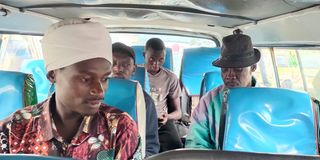I make money sitting in matatus at Nakuru mashambani stage

Elijah Wa Tene with other setis at Mashambani stage in Nakuru city.
You enter a matatu and notice that there are a few passengers inside. However, as more people come in, you realize others are stepping out, and not returning.
These people are placeholders, referred to as setis in sheng’.
Mtaa Wangu meets Elijah wa Tene at Nakuru’s mashambani stage. He has been a seti for two years.

Elijah Wa Tene during an interview with Mtaa Wangu at Mashambani stage in Nakuru city.
He reveals that his job is to act busy; either on phone, reading a magazine or just stares to pass time, and at the end of the day goes home with sh.20 per vehicle.
“My day starts as early as 6:00 am and ends at around 6pm, where the conductor or a driver of a certain company vehicle will select at least five of us to pretend we are passengers and sit in their vehicles.”
Tene says in a day he can become a placeholder for about 20 vehicles. He adds that he is busier during the morning hours when the number of passengers is low.
Tene insists that he only does this to make money. According to him, the money he collects in a month as a young bachelor is collectively more than enough for him, to settle all his bills.
Asked about how irritating their schemes can be to unsuspecting passengers, Tene says, “This is just a job for us. Since no human being would want to board an empty vehicle, we are therefore left with no choice but to put up an act.”
He further notes that he finds it funny when a customer would want a vehicle full, yet they have not brought people alongside with them to fill the vehicle.
As he concludes, Tene says, “to avoid enraging the passengers which is our main challenge, we mischievously get off the vehicle by pretending to ask for washrooms then hop onto the next vehicle.”
